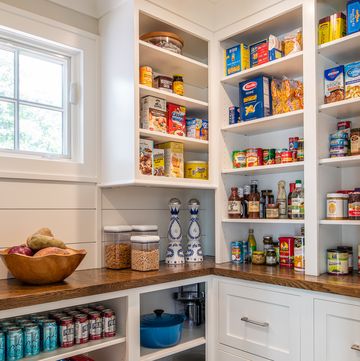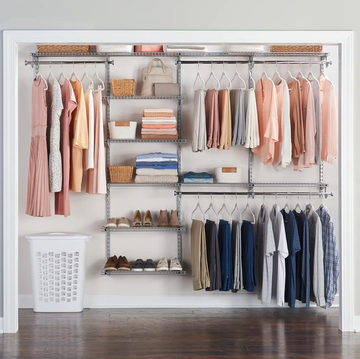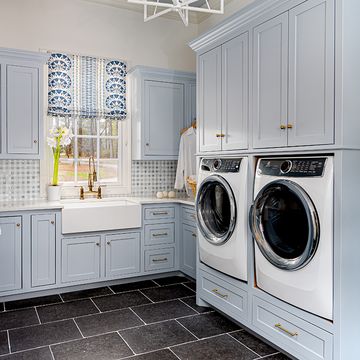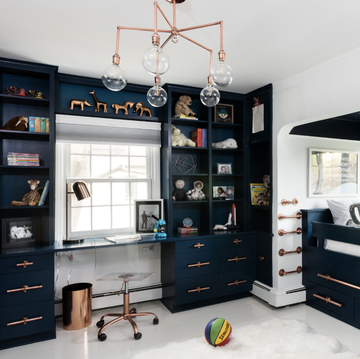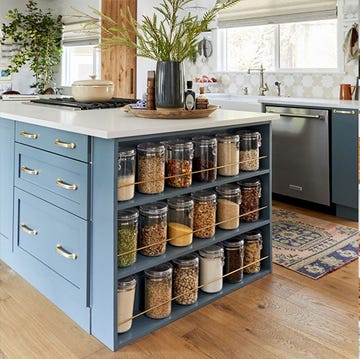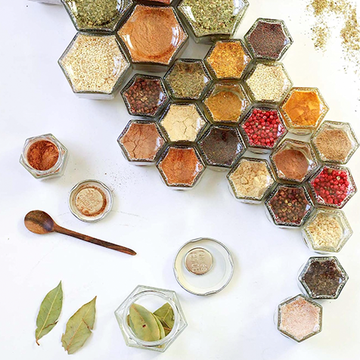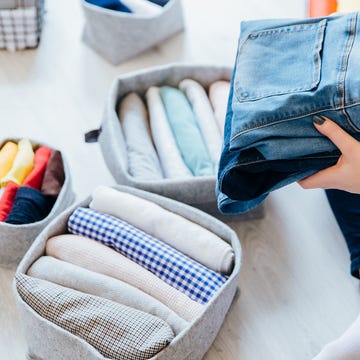During a big move or organizing project, it's tempting to stash boxes in out-of-the-way spots. But if you want your stuff to survive, you need to be careful about what you place in these decidedly not climate- or pest-controlled spaces.
1. Delicate fabrics
Mice, insects, temperature fluctuations, and water damage are all reasons to keep them in a closet instead. And beware, your beloved summer linen pants or cotton shirts are prone to moth infestation. "Often, people think it's just wool and are surprised to know that moths go after plant-based fibers, as well," says Lexie Sachs, textiles product analyst in the Good Housekeeping Institute.
Fur and leather need a reliably cool climate to stay looking their best. And vintage pieces, wedding gowns, sentimental baby clothing, and fine linens should all be cleaned and packaged by a professional cleaner, then kept in the main part of the house.
RELATED: The Smart Way to Store Winter Clothes »
2. Furniture and décor made from natural materials
Wood and upholstered furniture don't belong in the attic, basement, or garage. Wood mildews (you can try to bleach it, but may have to toss it). And area rugs, mattresses, and even plush toys are too susceptible to moisture damage to hold up for very long. "They all need dry, moderate temperatures for proper storage, and dampness from humidity or water leakage is a problem for everything,"says Carolyn Forte, director of the cleaning lab at the GHI. "It ruins items and promotes mold growth."
3. Important papers
Birth certificates, passports, marriage licenses, and school and medical records don't belong in boxes where they could become wet or illegible, says Bonnie Silverman, Broker Associate, RE/MAX Diamond, Realtors in Edison, NJ. "If important papers must be filed in the basement, put them into plastic containers up on a shelf. But a safe or a closet is a much better decision."
The same holds true for photos, books, and artwork, which can be ruined by moisture and extreme heat. "If they're not properly stored, they can suffer discoloration, staining, or even mold," she says.
RELATED: The Safe Way to Store Important Papers »
4. Food (unless you store it carefully)
"If you use your basement for provisions other than root vegetables, make sure those dry goods are in airtight canisters," says Sean Meredith of SM Inspection Services in Indianapolis. In fact, pack perishables in airtight plastic bags before the hard plastic containers to ward off insects and discourage mildew and rot.
5. Electronics
Extreme heat and moisture can wreck even the most well-made items.
6. Candles
Avoid putting extra tapers and pillars in the attic, where they're likely to melt during warmer months.
7. Anything flammable (near heat sources)
Paints, turpentine, cleaning products, gasoline, propane, kerosene, or other hazardous chemicals should never be located near anything gas-related (the furnace, water heater, dryer, fireplace, or a stove or oven) or in attic that tends to get very warm. "Many people tend to store these things in utility rooms near appliances and risk fire or possible destruction," Meredith says.
Here's what you can store in the basement or attic:
This bonus space is still a must-have for many homeowners. Use it to stash items including holiday decorations, kitchen supplies (like pots, pans, serving dishes, and plates), suitcases, and patio furniture, and take care to store what you can in air-tight containers — especially in the basement.
"There are two types of basements: Those that have flooded and those that have yet to flood," says Meredith, who recommends basement shelving that's at least a foot off the floor and hard plastic containers, instead of flimsy cardboard boxes.
"Climate control is your friend," Meredith says, so run a dehumidifier/humidifier if necessary. Says Jared Kennard of CMH Builders: "Just the humidity in the air can cause items to smell musty or damage wooden furniture." He says 50% to 60% humidity is ideal.
TELL US: What's your smart storage solution?
More Home Advice:
• 6 Things That Don't Belong in Your Garage
• 9 Smart Things to Do Before You Move
• 10 Cheap and Cheerful Ways to Update Your Kitchen
Photos: Getty






